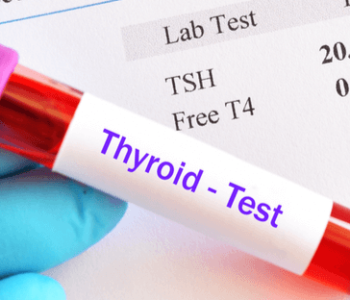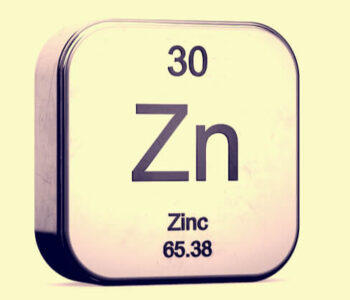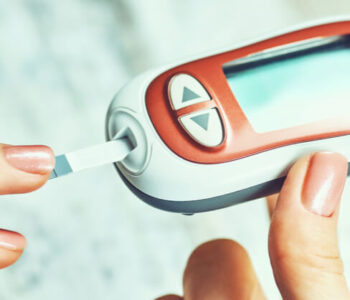In 30 Seconds…
Hyperthyroidism or an “overactive thyroid” occurs when your thyroid gland produces too much thyroid hormone.
If left untreated, it can cause a variety of health issues, which can affect your heart, muscles, hair growth, body temperature, and more.
Overactive thyroid symptoms for men are sometimes different to those experienced by women. In particular, it can affect testosterone levels, semen quality, and may also cause erectile dysfunction.
What is Hyperthyroidism?
Hyperthyroidism (otherwise known as an “overactive thyroid” or “thyrotoxicosis”) is when your thyroid gland produces more thyroid hormones than your body needs. If left untreated, it can cause a variety of issues — ranging from mildly unpleasant to potentially serious — affecting your heart, muscles, hair growth, body temperature, semen quality, and more.
Hyperthyroidism is in contrast to the far more common hypothyroidism (“underactive thyroid”), which occurs when your thyroid gland doesn’t make enough thyroid hormones to keep up with what your body needs.
Although rarer in men than in women — women are between 2 and 10 times more likely to develop hyperthyroidism — men can suffer from an overactive thyroid, with certain symptoms unique to their gender.
In this article, we explore the causes of hyperthyroidism, look at the symptoms (both in general and those unique to men), and explain how the condition is diagnosed and treated. But first…
What is the Thyroid?
Your thyroid is a small butterfly-shaped gland in your neck, found just in front of your windpipe (trachea). The gland produces two different hormones and secretes them into your bloodstream. The first is called thyroxine (T4) and the second is triiodothyronine (T3).
These hormones can affect your heart rate, body temperature, energy levels, and organ functions.
What Causes an Overactive Thyroid in Men?
The most common cause of hyperthyroidism in men is a condition called Graves’ disease. This is an autoimmune disorder where your immune system mistakenly attacks and damages an otherwise healthy thyroid gland. About 3 in 4 people with an overactive thyroid will be diagnosed with Graves’ disease.
Other, less common causes of hyperthyroidism include:
- Thyroid nodules: This is when lumps, which are usually benign (non-cancerous), develop on your thyroid. They may contain thyroid tissue, which can result in excess thyroid hormone production.
- Thyroiditis: A swelling or inflammation of your thyroid which can cause a surplus of thyroid hormones to be produced.
- Medication or diet: High levels of iodine in your body can knock your thyroid into hormone production overdrive. This can come from certain medications or iodine-rich foods, such as cod, tuna, and other types of seafood.
- Thyroid cancer: Very rarely, a cancerous tumour on your thyroid can increase the production of thyroid hormones.
What Are the Symptoms of Hyperthyroidism?
Hyperthyroidism can cause a wide range of symptoms. Some may develop gradually and can be difficult to spot, while others are more noticeable and can appear without warning. For example, you may not think twice about feeling tired or having difficulty sleeping, but muscle weakness or a rapid heartbeat can often be hard to ignore.
According to the NHS, the symptoms of an overactive thyroid can include:
- Anxiety, irritability, or nervousness
- Hyperactivity
- Trouble sleeping
- Feeling tired
- Mood swings
- Muscle weakness
- Heat sensitivity
- Diarrhoea
- Peeing more than usual
- Persistent thirst
- Itchiness
- Loss of libido (low sex drive)
Meanwhile, an overactive thyroid can result in the following physical signs too:
- Irregular heartbeat or fast heart rate (palpitations)
- Trembling or twitching
- Excessive sweating
- Swelling in the neck caused by an enlarged thyroid gland (known as a “goitre”)
- Loose nails
- Red palms
- Hives
- Unintended weight loss
- Increased appetite
- Dry, red eyes or eye problems such as double vision
Male-Specific Symptoms of Hyperthyroidism
Although men and women with hyperthyroidism will experience many of the same symptoms outlined above, several symptoms affect only men. These include:
- Erectile dysfunction (ED)
- Low sperm count
- Premature hair loss
- Low levels of testosterone
- Loss of muscle mass
- Osteoporosis
- Male breast enlargement (gynecomastia)
To shed a little more light on your thyroid’s impact below the belt, one study found that thyroid hormones can affect the production and secretion of testosterone in your testicles.
Both an excess and a deficit of the T4 and T3 hormones can result in semen abnormalities, with hyperthyroidism, in particular, associated with reduced semen volume and reduced sperm density, shape, and motility (how well your swimmers “swim”).
How Is An Overactive Thyroid Gland Diagnosed?
If you find yourself experiencing any of the symptoms or physical complaints outlined in this article, you should consider getting tested by a specialist known as an endocrinologist (a doctor specialised in hormone-related conditions).
Likewise, make sure you get screened for hyperthyroidism if you’re in one of the following risk categories:
- You have a family history of thyroid problems
- You are aged 60 or over
- You have type 2 diabetes
Your doctor will review your medical history and symptoms before conducting a physical examination. This will include checking your reflexes and closely examining your skin and eyes for signs of the condition.
You will also undergo a thyroid function test, which will look at the levels of thyroid-stimulating hormone (TSH) and thyroxine (T4) in your blood. Your results will be compared to what’s considered normal for a healthy person your age. Low levels of TSH and high levels of T3 and/or T4 would suggest you have an overactive thyroid.
Read more: Understanding Thyroid Function Test Results
In addition to the blood test, you may also receive a thyroid scan, which will look for lumps or nodules on your thyroid and examine the shape and size of the gland.
How is an Overactive Thyroid Treated?
Treating hypothyroidism (an underactive thyroid) is usually quite straight forward. When your thyroid isn’t producing enough thyroid hormones, you can top up your system by taking a synthetic thyroid hormone.
Treating an overactive thyroid, on the other hand, is a bit trickier and may only be resolved via surgery. However, you will likely follow this treatment plan before going under the knife:
- Medication: First, you will probably be prescribed an antithyroid medication, such as propylthiouracil, to try and encourage your gland to produce less of the hormones. This can cause a few side effects, including sore joints, headaches, nausea and high temperatures. But these should pass as your body gets used to the medication.
You may also be prescribed beta-blockers to help lower your heart rate while the antithyroid medication does its thing.
- Radiotherapy: If the medication doesn’t work, you will probably move onto radioactive iodine treatment. This involves swallowing a drink or capsule containing iodine and a low dose of radiation. The radioiodine mixture is absorbed by your thyroid to destroy the cells in the thyroid gland, therefore reducing the amount of thyroid hormone it can produce.
Most people only require one treatment, but men should avoid fathering a child for at least 4 months following this particular course of action. - Surgery: Finally, if the above treatments don’t work or if your thyroid is severely swollen, you’ll be recommended for a surgery called a thyroidectomy. This involves removing part or all of the thyroid to lower the level of thyroid hormones produced. You would then take a synthetic thyroid hormone for the rest of your life to keep your thyroid hormone levels within a healthy range.

Help your body fight the good fight
Supplements are all-important when it comes to keeping your health at its best. All our health supplements are formulated by our medical team and packed with the best ingredients out there.
Key Takeaways…
The sooner you deal with the symptoms of hyperthyroidism, the less likely you are to face long-term health issues. If you have noticeable symptoms or you find yourself in one of the risk categories, don’t delay — seek medical advice and get screened as soon as possible.












